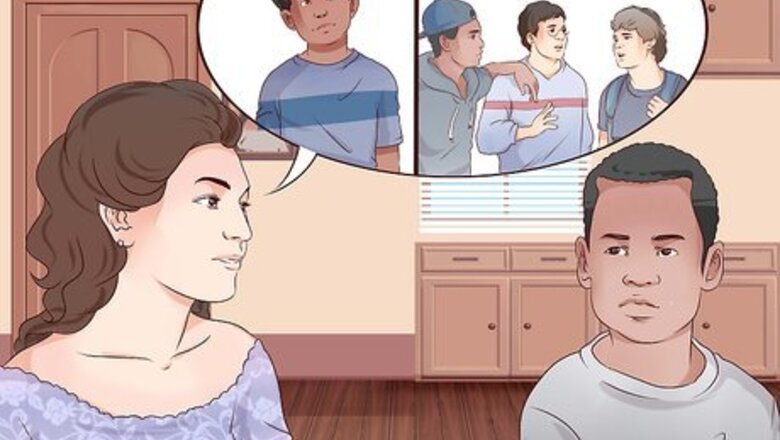
views
Explaining Basic Social Skills to Children
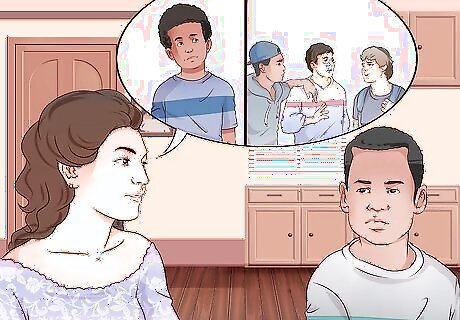
Explain personal space. One of the basics of social skills involves personal space. Young children may fail to understand everyone has a personal space bubble that should be respected. Explain to kids that personal space varies from person to person, and from culture to culture. People they are closer to, like relatives and siblings, may be more open to hugging and touching than strangers. Likewise, people from other cultures may prefer more or less personal space. Tell kids how to read body language. Teach them that people tensing up, crossing their arms, and backing away is a sign their personal space is being invaded. You should also let kids know they're entitled to their own personal space. Do not pick them up without their permission, or hug them if they do not want to be hugged. Let them know they have authority over their own bodies. Teach children to do the same in return. Have them ask permission before hugging people, sitting in people's laps, and so on.

Teach empathy. Empathy is another important basic of social skills. A young child's perspective is limited. Children may struggle to understand how to put themselves in another person's shoes. Try to make an effort to help kids understand empathy. Encourage kids to use their imagination. Have them picture themselves in a variety of different scenarios. Look for learning opportunities throughout the day. For example, if your child tells you he or she saw someone getting picked on in school, encourage your child to imagine how they would feel in a similar scenario. When watching TV or movies, ask your kids how they think a character is feeling and why. Encourage them to imagine themselves in a similar scenario and think about how they would feel.
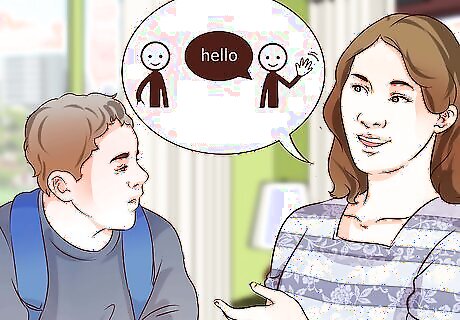
Help kids understand how to have a conversation. Basic conversation skills are vital to social development. Young children are often unsure of how to converse, and may be prone to interrupting conversations or ignoring what's being said. Talk to your kids about basic conversation skills. Talk to kids about how to enter a conversation. Explain basic greetings. Instruct children to greet others by saying things like, "Hi!" and "How are you?" Explain non-verbal cues as well, like waving, smiling, nodding, and hand shaking. Explain to children they should take their turns speaking in conversation. Tell them it's important to wait until someone else finishes talking before interjecting. Also, teach kids about listening. Explain that, in a conversation, you should respond to what the other person is saying rather than simply talking about yourself. Teach your children how to be assertive when they talk to people as well. Explain to your child that being assertive is not the same as being aggressive. It means asking for what you want in a direct, honest way. People who communicate in an assertive way do not use threats, insults, or excuses to get what they want.
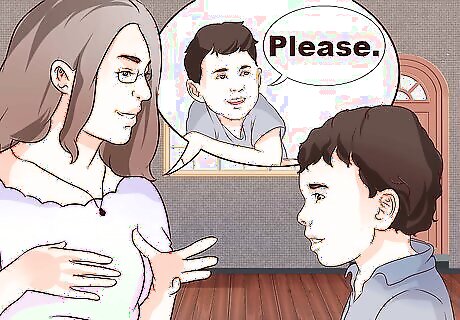
Teach about basic manners. Children often do not know basic manners, so these are important to teach as well. Explain to kids it's very important to say please, thank you, excuse me, and other forms of common courtesy. Make a rule in your home about remembering pleases and thank-yous. This will show children how to convey positive manners.
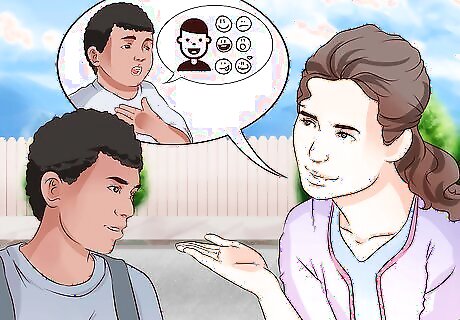
Talk about expressing wants and needs. Children may often accidentally say insulting things when trying to express wants and needs. For example, your daughter may tell her older brother he's mean if he doesn't give her a turn during a game. What she's trying to communicate is that dislikes feeling left out. Teach children how to appropriately tell others what they want and need. Catch children in the moment. You may hear your son tell your daughter that she's hogging a toy. Interject with something like, "Mason, what you really mean is that you want Charlotte to give you a turn. Tell her you want to feel included as well." Teach children to be upfront with other people about behaviors that make them uncomfortable. A preschool age child may kick and hit when he feels he's being made fun of. Instead, teach him to use his words. Tell him, when he's met with mockery, to say something like, "It hurts my feeling when you talk like that and I need you to stop." Have children stop and think when they're upset. If a child is not sure what he or she wants or needs, ask questions to help that child figure this out. Ask something like, "Why does that make you angry? Why do you react that way?"
Practicing Activities that Teach Social Skills

Read to your kids. Reading fiction has been shown to help foster feelings of empathy in both children and adults. Go for high-quality literary children's stories over popular fiction, as characters are often less developed in works designed for a mass audience. Classic children's stories, like The Little Prince and Charlotte's Web, may help children develop empathy. This can help kids learn better social skills throughout life.
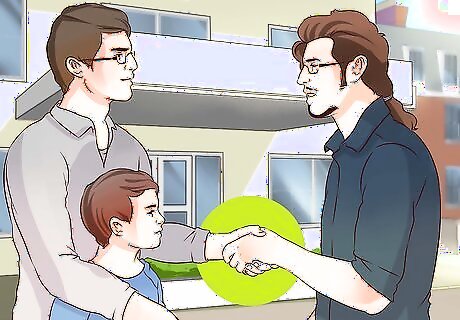
Model good behavior. A great way to help your kid understand social skills is to simply model good behavior yourself. Be respectful of others during your day-to-day life. If your take your kids grocery shopping, make polite conversation with the cashier. When you pick your child up after school, be kind and courteous to other parents, teachers, and school officials. Children look up to their parents and will pick up on good habits from observing you.
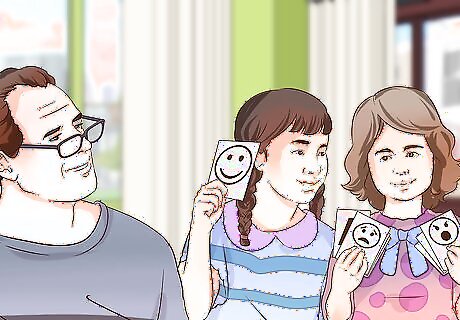
Play emotional charades. Emotional charades is a great game designed to teach children to read non-verbal social cues. To play the game, you can write down a variety of emotions on pieces of paper, like happy, sad, scared, etc. Then, place the slips of paper in some kind of container. Take turns drawing slips and acting out the emotions. This can help teach kids to recognize what someone looks like when they're experiencing a certain emotion. You can also play a variation that's like pictionary. Have your kids draw pictures of people or animals conveying a certain emotion and try to guess that emotion.
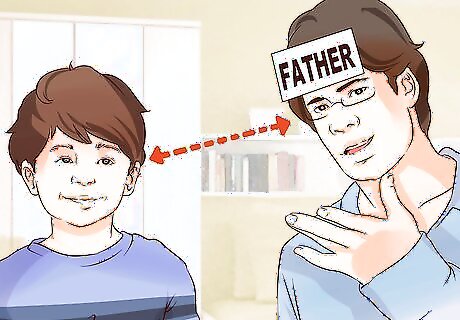
Play games that encourage eye contact. Eye contact is also an important social skill. In western culture, the ability to maintain eye contact shows someone that you're listening and paying attention. Play games that teach kids how to maintain eye contact. Staring contests can be a fun, playful way to teach your kids about eye contact. You can play a game called "Eyes on the forehead." Place a stick of a pair of eyes on your forehead and instruct your kids to keep an eye on the sticker. This won't be eye contact, exactly, but it will give kids a sense of the direction they should look when talking to someone. When playing on a swing, encourage your child to make eye contact with you. Make sure that you teach your child that not all cultures value eye contact and some cultures even consider making eye contact to be rude.
Supporting Your Child's Social Life
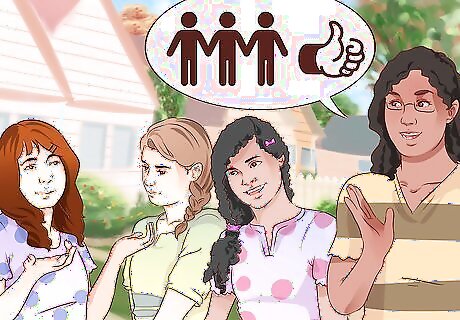
Support friendships. Friendships are important to a child's social development. In order to help your child develop social skills, support his or her friendships. Help them blossom and develop. Host playdates. Talk to parents of your children's friends and offer to have the kids over for a day. Take your kids to events where he or she will see friends. School events, birthday parties, and trips to places like the park can be a great way to assure your child sees his or her friends regularly. Help your child deal with rifts with friendships. Explain that it's normal for friends to fight or get angry with one another. Encourage your child to apologize if he or she hurts a friend's feelings.
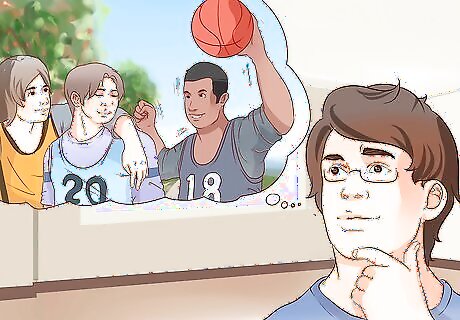
Have your kids play team sports. Research shows important social skills, like leadership and empathy, can be learned through team sports. If your kids are interested in sports, consider enrolling them in a little league team of some kind. In addition to having a positive effect on overall social skills, playing sports encourages physical activity and healthy habits. Kids who engaged in team sports during their youth are less likely to smoke and also may have better self-esteem. Keep in mind, however, that not all kids enjoy sports. If your child is very resistant to sports, don't force it. There are many other extracurricular activities that promote teamwork and togetherness. These can be just as beneficial as team sports to your child.
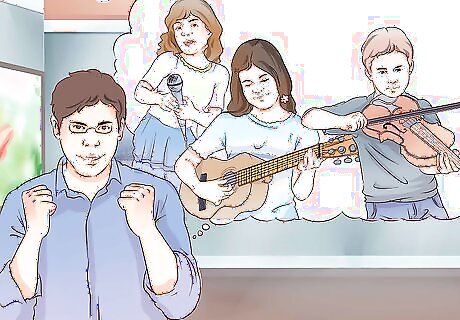
Get your kid involved in extracurriculars. Extracurriculars can be a great way to encourage kids to develop social skills. Encourage your kids to join clubs at school or get involved in local organizations. Cater to your child's interest. If your kids are interested in writing and art, have them take classes at a local art center or sign up for the school paper. Think about clubs like Girl Scouts or Boy Scouts. Many children learn vital skills through such organizations.
Seeking Outside Support

See a therapist, if necessary. If your child does not seem to be developing socially, this could be indicative of an underlying mental health disorder. If you have concerns about your child's social development, talk a child psychiatrist or therapist. You can ask your child's regular doctor for a referral or find a therapist through your insurance provider.
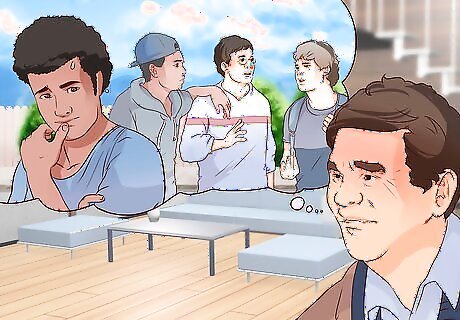
Recognize social delays in children. If your child is not developing socially, this can be a sign that something is different. A variety of conditions, like genetic disabilities or autism, can cause your child to develop at a slower or uneven pace. Seek help from a pediatrician or child psychiatrist if your child seems to have difficulties in the following areas: Between 19 and 24 months, your child may not interact with others. Your child may not smile when looking at you or give reaction. A child may also not engage in play or recognize pictures of familiar objects. These symptoms can indicate that your child may be autistic. With autism, as a child gets older, social development may continue to move slowly or at an uneven pace. A child may not engage in brief conversations, follow simple directions, listen to stories, make friends, initiate conversations, or express physical states. This means, your child may not say things like "I'm hungry" or "I'm hurt."

Talk to your child's teachers. You should make a point of talking to your child's teachers regularly. Make sure you ask the teacher about your child's social development. You also want to make sure your child is not getting bullied or harassed in school. Bullying can set a child back slightly in social development. Having a healthy relationship with your child's teacher can help you keep your eye out for issues like bullying.

















Comments
0 comment